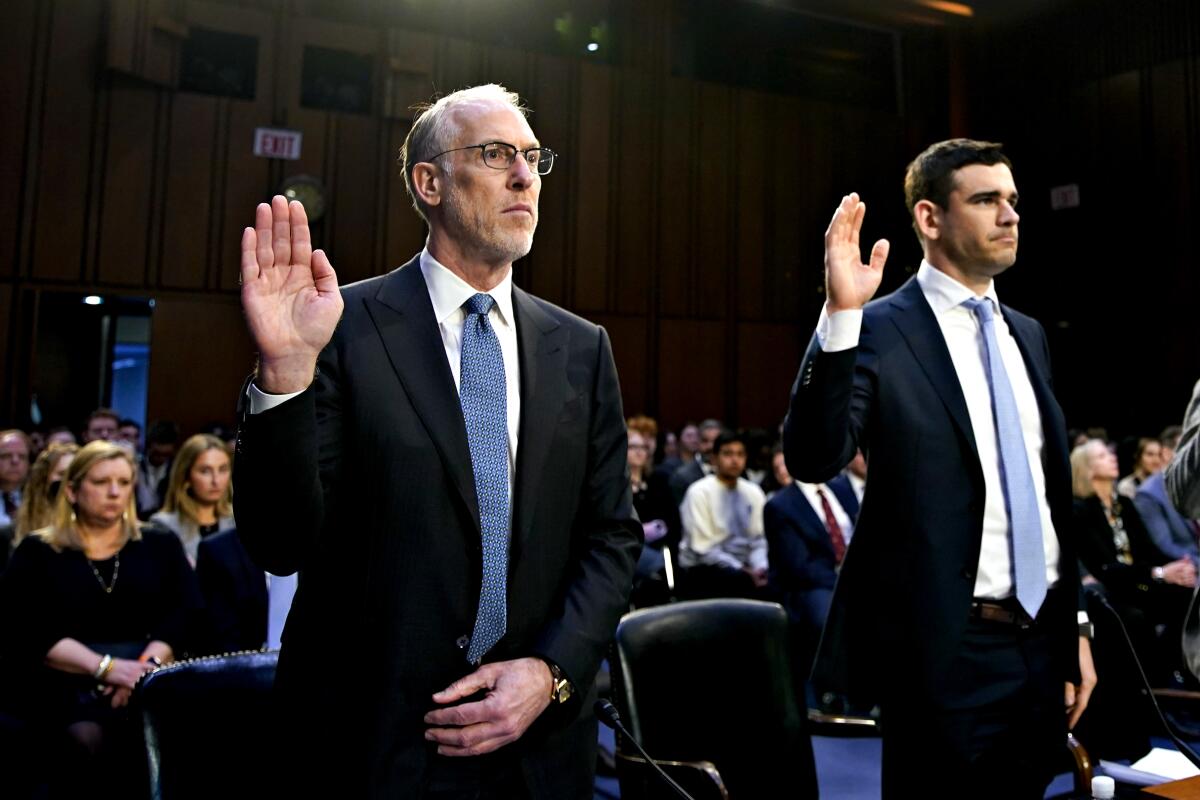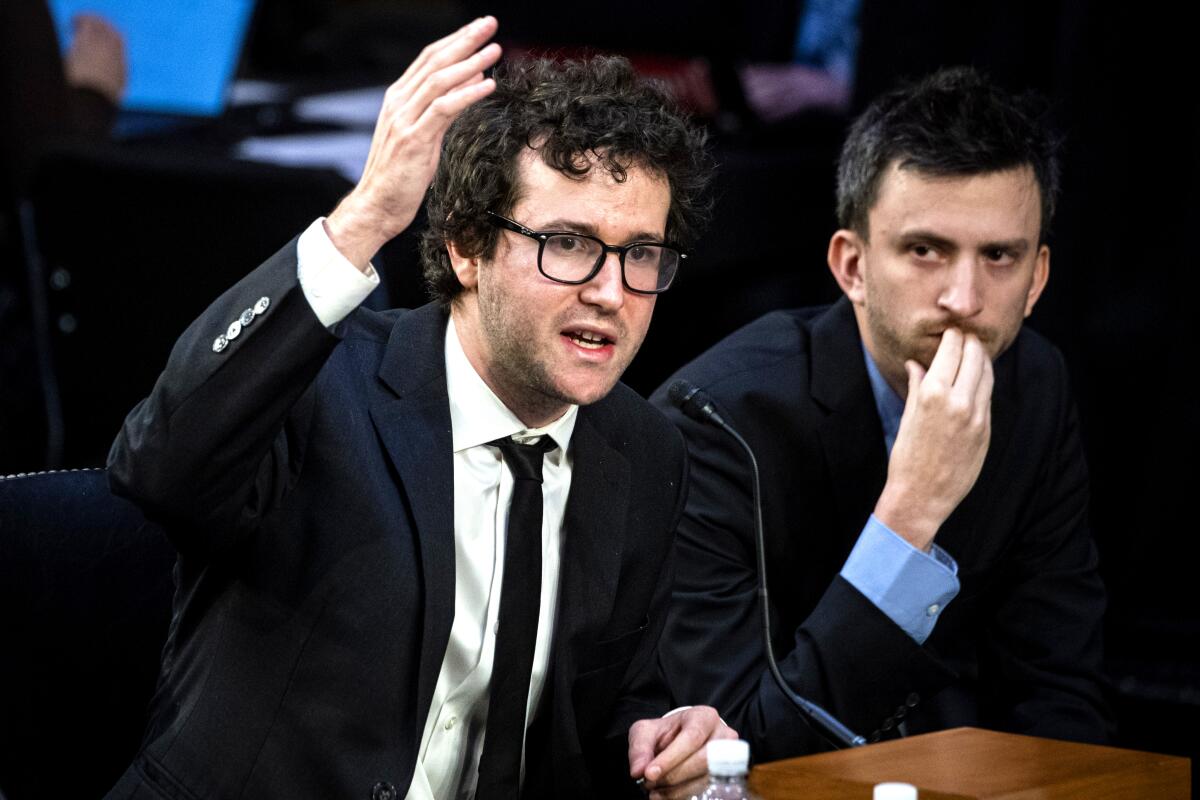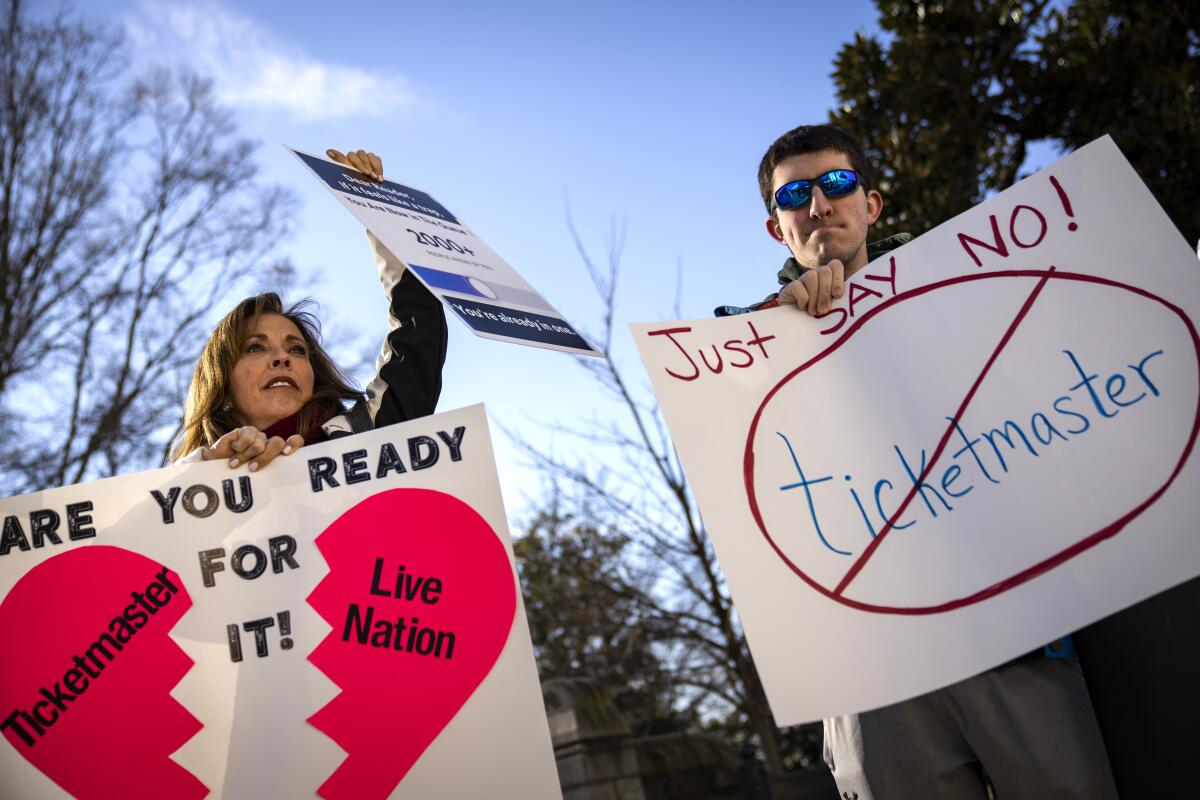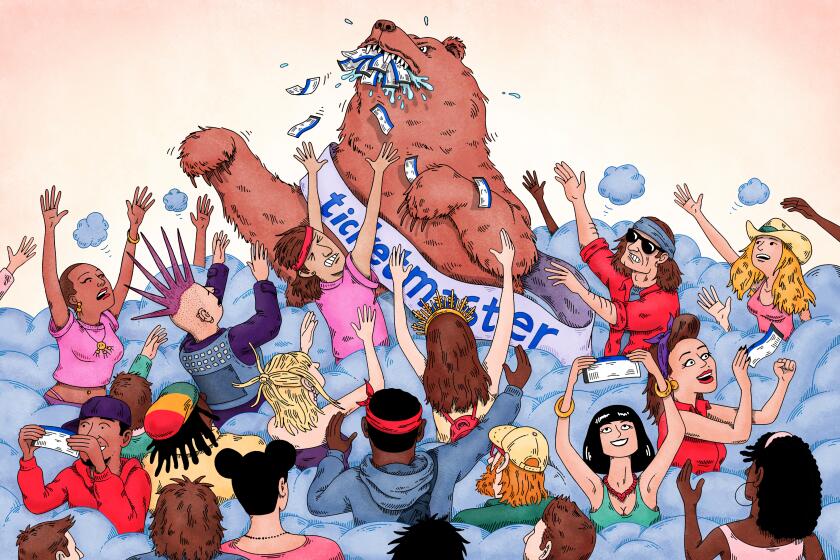Ticketmaster gets a bipartisan grilling on Capitol Hill

- Share via
It was only a matter of time before a politician awkwardly quoted Taylor Swift at Tuesday morning’s Senate Judiciary Committee hearing on Ticketmaster, Live Nation and the U.S. ticketing market.
“May I suggest respectfully that Ticketmaster ought to look in the mirror and say, ‘I’m the problem. It’s me’” Sen. Richard Blumenthal (D-Conn.) told Live Nation Entertainment’s President and Chief Financial Officer Joe Berchtold, referencing the chorus to Swift’s No. 1 song, “Anti-Hero.” “The reason is, quite simply, that you are the ones ultimately responsible for the astronomically rising prices, the exorbitant hidden fees, the sold-out shows and the bots and scalpers.”
In November, Ticketmaster bungled the on-sale for Swift’s upcoming stadium tour, prompting outcry from demoralized fans who were left ticket-less and, soon thereafter, criticism from a range of politicians and a class-action lawsuit from disgruntled Swifties. Tuesday’s hearing, led by Senators Amy Klobuchar (D-Minn.) and Mike Lee (R-Utah), showed bipartisan skepticism towards the Live Nation/Ticketmaster conglomerate, which dominates the live music market.
Critics contend that Live Nation, which merged with Ticketmaster in 2010, exerts undue power over the concert industry. Live Nation is the country’s largest concert promoter, while Ticketmaster controls an estimated 80% of the ticketing market. The companies were allowed to merge under a Department of Justice consent decree that forced Ticketmaster to license its software and prohibited retaliatory behavior against competitors.
Fans, politicians and even artists were complaining about Ticketmaster long before Taylor Swift filled stadiums. But experts say the anger may be misplaced.
Tuesday’s hearing, which featured testimony from ticketing executives, independent promoters, antitrust experts and artists, scrutinized the company’s alleged anticompetitive practices, high service fees and inability to weed out automated scalpers from the ticket-buying process. The aggressive line of questioning from both Democratic and Republican senators made clear that there is a real regulatory and legislative threat to Live Nation and Ticketmaster’s business model — and perhaps its future as a single company.
“Innovation in live event ticketing has been stunted because Live Nation Entertainment Inc. controls the most popular entertainers in the world, the ticketing systems, and even many of the venues,” said Jack Groetzinger, co-founder and chief executive officer of SeatGeek, a direct competitor to Ticketmaster. “This power over the entire live entertainment industry allows Live Nation to maintain its monopolistic influence over the primary ticketing market. As long as Live Nation remains both the dominant concert promoter and ticketer of major venues in the United States, our industry will continue to struggle with the challenges that face it today.”

Clyde Lawrence, singer for the New York soul-pop band Lawrence, said that “ever since we started touring, we noticed what felt like lopsided deal mechanics in certain aspects of the live music industry.”
Live Nation’s “horizontal and vertical reach makes it hard to create competition,” he continued. “Companies in the ticketing space might bring major innovations that allow for lower fees, greater transparency ... and advancements in handling the problematic secondary ticketing market … But it doesn’t matter how innovative these other ticketing companies are; if every Live Nation show needs to be ticketed exclusively through Ticketmaster, there’s no chance for them to break through.”
Kathleen Bradish, of the American Antitrust Institute, went even further.
“Live Nation / Ticketmaster is a monopoly,” she said, “and will act because it has a vast incentive to exclude competition.”
“Ticketmaster comes under a lot of criticism,” Berchtold acknowledged in his opening remarks. “But I can say with great confidence that technologically Ticketmaster is a much better ticketing system today than it was in 2010. Its performance in large on-sales is the best in the industry, it has the best marketing capabilities of any ticketing system and it is far and away the leader in preventing fraud and getting tickets into the hands of real fans.”
Over three hours of testimony and questioning, nearly every senator attending had at least some angle to criticize the firm.
“Back in 2018, thousands of people in Hawaii tried and failed to get Bruno Mars tickets,” said Sen. Mazie Hirono (D-Hawaii). “I’ve heard Mr. Berchtold say that after the merger, they spent $1 billion to improve the Ticketmaster system. So I’m just wondering what kind of improvements to the Ticketmaster system are actually being followed?
“I’m against dumb, and the way company handled the on-sale for Ms. Swift was a debacle,” said John Kennedy (R-La.). “Whoever was in charge of that should be fired.”
Marsha Blackburn (R-Tenn.) raised concerns that the company wasn’t doing enough to fight bots or automated scalping. “You have blamed bot attacks on causing the the crash during the Taylor Swift ticket sales. Ticket vendors seem to view bot attacks as normal to their operations,” Blackburn said. “This is an unacceptable situation.”

Several speakers brought up the recent changeover at Brooklyn’s Barclays Center, which switched back to Ticketmaster after ending a contract with SeatGeek one year into a seven-year deal. Some on the panel suspected Live Nation had retaliated to Barclays deal with SeatGeek by moving its concerts to competing area venues.
“The Barclays Center saw a marked decrease in the number of concerts from Live Nation that were sent to that venue versus historical averages,” Groetzinger said. “Management came to us and said we want to be able to use Ticketmaster to ticket concerts, and we looked into it and couldn’t get the economics to work.”
“The DOJ pointed to a pervasive environment of fear of retaliation,” Bradish agreed. “And as a result, it shows that when a company has incentives to act in a particular way, a consent decree isn’t necessarily going to stop them from doing that.”
The Department of Justice has an ongoing investigation into Live Nation’s practices.
“To the people who are fed up, I would say, continue your criticism if you’re angry and frustrated,” Blumenthal said. “You got the power to demand action, and we should act with new legislation. If the Department of Justice established a violation of the consent decree, unwinding the merger ought to be on the table.
“If the Department of Justice establishes facts that involve monopolistic and predatory abuses, there ought to be structural remedies,” he continued. “Such as breaking up the company.”
More to Read
The biggest entertainment stories
Get our big stories about Hollywood, film, television, music, arts, culture and more right in your inbox as soon as they publish.
You may occasionally receive promotional content from the Los Angeles Times.












